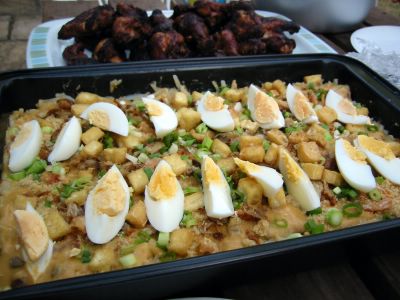Well, most of the ingredients like garlic, green onions, pork cracklings (chicharon), and shrimps are widely available so no problem with that. For the other key ingredients like tinapa - I substituted smoked mackerel; achuete - although I had this, you can substitute it with red food colouring; calamansi - use lemon or lime or combination. The only problem is the red sauce that is at the very heart of this dish. I ran out of those ready mix packets that is so common nowadays. I didn't want to make it from scratch, i.e., pound shrimp heads, squeeze out juice, thicken with cornstarch then redden with achuete, too tedious for me. My SIL, Ate Eva, from Toronto came to my rescue saying that they've been using condensed cream of mushroom soup in place of the red sauce for ages. She was right, it was a good substitute although it's obviously on the creamy side. Trust the ingenuity of hungry Pinays to come up with the goods no matter where they are in the world. So there I have it, all the ingredients for a pancit palabok.
My next gripe would be the noodles. Or maybe lets discuss first the different names associated with this type of dish. Where I come from in Cavite, it's always called pancit luglog and almost always had the thin rice vermicelli - you know the kind that you use for the pancit guisado. The term 'luglog' would stem from the way the noodles are cooked or heated. 'Luglog' in Tagalog means 'to dip'. The tindera (vendor) would put a portion of the noodles in woven (bamboo?) elongated ladle-like tool then dip it for a few minutes in a big pot with continously boiling water or stock (for better taste). She would then put it in its eco-friendly packaging - cone-shaped wrapper of banana leaves and old newspapers. I don't know if it's peculiar to Cavite but the version there uses lots of sliced lip-puckeringly sour kalamias. I loved the the crunch and sourness it imbibes in my fav afternoon snack.
As for the pancit palabok, it was only when I moved to the suburbs of Manila that I began hearing it referred to as such. What I saw was essentially the same but for the noodles which was noticeably thicker. The word 'palabok' literally means garnish, decoration or embellishments. So it refers to the numerous things you sprinkle on top of the red sauce.
Now for the noodle gripe, I have no problem with the rice vermicelli but if you're going to serve this as a pre-mixed buffet dish it's best to use the thicker rice noodles so as to not make it too soggy while it's sitting there on the table. As of now, I haven't found a brand of thick noodles that I could say I'm satisfied with. All of the ones I tried takes about 25 minutes of boiling before it gets completely cooked. At that point it has disintegrated to 1-2 inch pieces and the water I boiled it in looked like those gawgaw mixtures my mother used to starch our clothes in! My sister told me that our aunt Ate Letty soaks her noodles first before boiling it. I did one time but still it broke up into pieces it did not hold its long strands (although it took less boiling this time.) Fortunately despite this limitation, the noodles is still completely edible though I would preferred it if the cooked strands are longer.

Expat's Pancit Palabok
450 g thick rice noodles
1 x 425 g can of condensed cream of mushroom soup
3 Tbsp achuete seeds (or red food colouring)
1/2 cup hot water
drop of lye water (optional)
150 g smoked fish (mackerel or haddock)
5 spring onions - chopped
1 whole head of garlic - minced
250 g of fresh shrimps or 1/2 cup of dried shrimps (hibe)
4 squares of tofu - diced (optional)
100 g of pork cracklings (chicharon) - ground/pounded
3 hard boiled eggs - quartered
lemon juice mixed with fish sauce (patis)
- Soak the rice noodles for several hours or overnight.
- Bring a potful of stock or water to boil. Drop the soaked rice noodles in it and cook until done.
- Soak the achuete in the hot water for at least 30 minutes. (Optional) Put 1 or 2 drops of lye water in it, stir to mix and soak for a few minutes more. Drain and reserve the water.
- Steam the fresh shrimps, cool, then peel them and set aside. If you're using dried shrimps - soak them in warm water for about 1 hour. Drain water and then set aside.
- Remove skin of the smoked fish and shred it. Dry fry (means no oil) or bake for a few minutes. Set aside.
- If using tofu, fry in oil until crispy. Set aside.
- Fry the minced garlic gently in oil. Drain from the oil and reserve both fried garlic and the oil used.
- Combine the cream of mushroom soup and achuete water in a saucepan. Cook gently while stirring. If the sauce is too thick add a little water at a time until it is about the consistency of yoghurt.
- To assemble buffet style:
- Mix a portion of noodles with the red sauce, some garlic, pork crackling, spring onions, shrimps, and tofu. Add some lemon juice/patis mixture to taste. Transfer to the serving dish.
- Repeat the procedure until you have filled up your serving dish. Spread a thin layer of the red sauce on top and garnish with garlic, pork crackling, spring onions, shrimps, tofu, then topped with hard boiled eggs.
- Serve lemon juice and patis on the side.
No comments:
Post a Comment